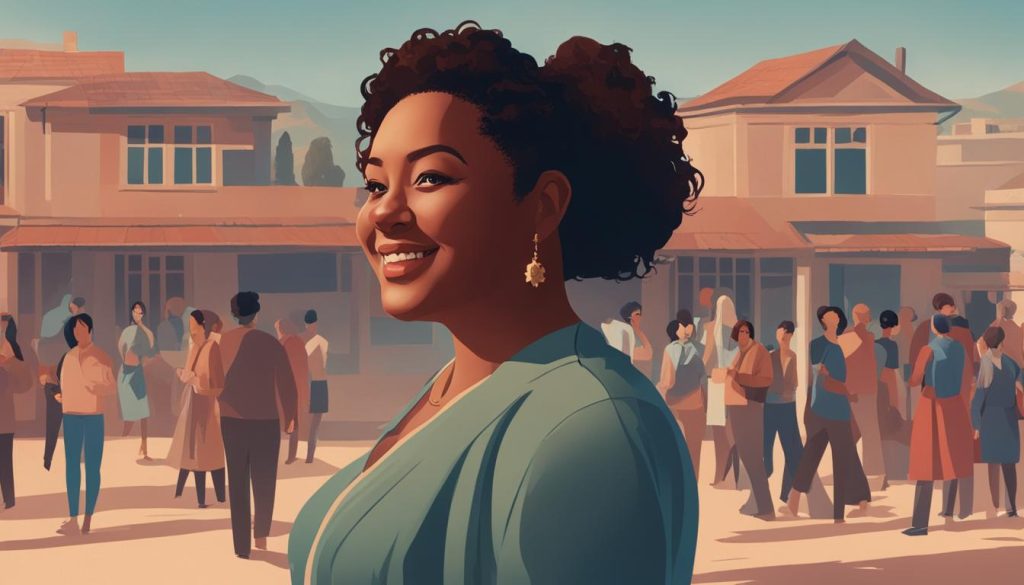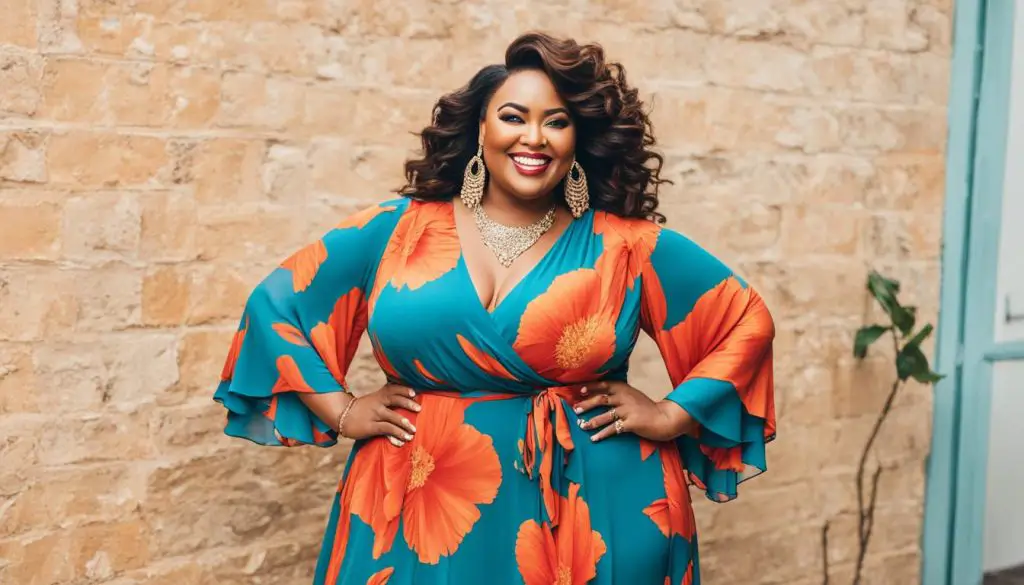Can a fat woman be attractive? This question has sparked much debate and controversy in recent years. Society’s beauty standards for overweight women have traditionally been restrictive, favoring thinness as the epitome of attractiveness. However, the body positivity movement has challenged these norms and celebrates the beauty of women of all sizes.
Instead of adhering to unrealistic beauty standards, the body positivity movement encourages women to embrace their bodies and love themselves as they are. It emphasizes that attractiveness is not limited to a specific body size or shape.
By embracing different body types, the body positivity movement aims to redefine beauty standards and promote inclusivity. It recognizes that beauty is subjective and differs from person to person.
Table of Contents
Key Takeaways:
- The body positivity movement challenges traditional beauty standards for overweight women.
- Attractiveness is subjective and not limited to a specific body size or shape.
- Embracing different body types promotes inclusivity and redefines beauty standards.
- Self-love and acceptance are central to the body positivity movement.
- Beauty is not defined by societal norms but by individual perception.

The Nuances of Attractiveness and Body Acceptance
The concept of attractiveness extends far beyond physical appearance. It encompasses a range of attributes, such as confidence, personality, and individuality. While societal norms have traditionally dictated a narrow definition of beauty, there is a growing movement that challenges these standards and celebrates body diversity. Plus-size models like Ashley Graham have made significant strides in redefining beauty standards and highlighting the beauty and confidence that plus-size women possess.
The body acceptance philosophy promotes self-acceptance and rejects the societal pressure to conform to rigid beauty ideals. It emphasizes that beauty is not limited to a specific size or shape but is inclusive of all bodies. This philosophy encourages individuals to cultivate self-confidence and embrace their unique qualities, ultimately challenging the societal norms of attractiveness.
Embracing diversity in beauty means recognizing that there is no one-size-fits-all definition of attractiveness. It is about celebrating the uniqueness and individuality of each person, regardless of their body size or shape.
It is important to understand that physical attraction is subjective and deeply ingrained in human nature. While it is crucial to celebrate and uplift plus-size women and challenge societal norms, it is also essential to recognize that physical attraction is not fair or equitable. Each person’s preferences and perceptions of attractiveness are shaped by a complex array of factors, including cultural influences and personal experiences.
The Role of Confidence in Challenging Societal Norms
Confidence plays a significant role in challenging societal norms of attractiveness. When individuals exude self-assurance and embrace their bodies, they challenge the notion that beauty is determined solely by physical appearance. Confidence allows plus-size women to navigate the world with a sense of empowerment and authenticity, defying the narrow beauty standards that have been ingrained in our society for far too long.
Gaining confidence is a personal journey that involves self-reflection, self-acceptance, and self-love. It requires challenging the negative self-talk and societal messages that perpetuate body shame and embracing a positive mindset. With confidence, plus-size women can inspire others to redefine beauty standards and cultivate a culture of inclusivity and acceptance.
| Benefits of Redefining Beauty Standards | Challenging Societal Norms |
|---|---|
| 1. Promotes body positivity and self-acceptance | 1. Encourages a shift towards inclusivity |
| 2. Breaks down harmful stereotypes and prejudices | 2. Fosters a more diverse and representative society |
| 3. Empowers individuals to embrace their unique beauty | 3. Inspires confidence and self-worth in plus-size women |
By redefining beauty standards and promoting confidence in plus-size women, we can challenge societal norms of attractiveness and create a world that celebrates the beauty of all body types. It is time to embrace and uplift the diversity of beauty, empowering individuals to love themselves and challenging the restrictive ideals that have limited our understanding of attractiveness.
Personal Journey to Self-Acceptance
Throughout my life, I’ve embarked on a transformative body positivity journey, learning to embrace my appearance and overcome societal beauty standards. Like many others, I grew up surrounded by unrealistic expectations of what it meant to be beautiful. The media, my family, and society at large constantly reinforced these unattainable ideals, leaving me feeling inadequate and insecure about my own body.
However, as I entered my adulthood, I began to question these narrow definitions of beauty. I realized that true beauty isn’t about conforming to societal norms, but about embracing and celebrating one’s unique features. It’s about finding confidence and self-acceptance in a world that often tries to dictate how we should look.
My body positivity journey wasn’t an easy one. It required me to challenge deeply ingrained beliefs and shed the weight of societal expectations. I had to reframe my mindset and recognize that my worth couldn’t be dependent on my physical appearance. It was a process of unlearning the toxic messages I had absorbed and replacing them with self-love and acceptance.
“You are not defined by your size or shape. Your worth goes far beyond what the mirror shows.”
Rejecting the imposed beauty standards was liberating. It allowed me to break free from the constant striving for an unattainable ideal and instead focus on nurturing my mental and emotional well-being. I began to appreciate my body for what it could do rather than how it appeared to others.
My journey towards self-acceptance coincided with a midlife awakening. It was a time where I started to value my own voice and perspectives, realizing that societal expectations should not dictate how I feel about myself. I discovered the power of self-love and authenticity, embracing the unique beauty that radiates from within.
Although embracing my appearance has had its challenges, it has been a deeply rewarding and transformative experience. I now know that true beauty goes beyond outward appearances and resides in the confidence and love we have for ourselves.
Obesity as a Chronic Disease
Obesity is a chronic disease that affects a substantial number of people in the United States. It is a complex condition influenced by a combination of genetic and environmental factors. Contrary to common misconceptions, obesity is not solely a result of personal choices or laziness, but a disease that requires comprehensive understanding and treatment.
Misunderstandings about obesity contribute to stigmatization and hinder effective management. By recognizing obesity as a disease rather than a self-inflicted behavior, we can foster empathy and support for individuals facing weight-related challenges. It is crucial to dispel the myths surrounding obesity and promote accurate knowledge.
While diet and exercise are important factors in weight management, they are not always sufficient on their own. Obesity involves complex physiological processes and metabolic dysregulation that make it difficult for some individuals to lose weight through traditional methods alone.
Addressing the disease of obesity requires a multidisciplinary approach, including medical interventions, psychological support, and lifestyle changes. It is vital to collaborate with healthcare professionals to develop personalized treatment plans tailored to each individual’s unique needs.
The Cycle of Misconceptions
“Obesity is more than overeating or being lazy. It is a complex condition influenced by various factors.”
– Dr. Lisa Thompson, Obesity Specialist
Many misconceptions perpetuate the stigma surrounding obesity, hindering progress in addressing this disease. One common misconception is the belief that obesity is solely a result of personal choices and lack of willpower. This oversimplification fails to consider the biological and environmental factors that contribute to weight gain and make weight loss challenging.
Another misconception is the idea that obesity is a cosmetic issue rather than a disease with significant implications for overall health. Obesity increases the risk of developing various health conditions, including heart disease, type 2 diabetes, certain types of cancer, and mental health disorders.
By understanding the disease of obesity, we can challenge these misconceptions and support individuals affected by this chronic condition. Empathy and education play crucial roles in promoting a more inclusive and compassionate society.
The Impact of Obesity
Obesity imposes a significant burden on individuals and society as a whole. Health complications associated with obesity place a substantial strain on healthcare resources and contribute to rising healthcare costs. Additionally, the social and emotional consequences of obesity, such as discrimination and reduced quality of life, further exacerbate the impact of this disease.
Understanding the complexities of obesity allows us to develop strategies that go beyond simplistic solutions. It requires a shift in mindset from judgment to empathy, enabling us to support individuals in their journey towards better health and well-being.
Recognizing obesity as a chronic disease acknowledges the need for comprehensive and personalized approaches to treatment. By challenging misconceptions and fostering understanding, we can create a more compassionate and supportive environment for individuals affected by obesity.
| Benefits of Understanding Obesity as a Disease | Benefits of Challenging Misconceptions |
|---|---|
| 1. Improved access to healthcare resources | 1. Reduced stigma and discrimination |
| 2. Increased funding for obesity research | 2. Greater empathy and support for individuals affected by obesity |
| 3. Enhanced collaboration between healthcare professionals and patients | 3. Promotion of body positivity and acceptance |

By working together to understand the complexities of obesity and challenge misconceptions, we can create a society that embraces health, diversity, and compassion.
The Intersection of Obesity and Health in the COVID-19 Pandemic
During the ongoing COVID-19 pandemic, it is imperative to prioritize overall health and wellness. Individuals with obesity may face a higher risk of experiencing more severe symptoms of the virus. The impact of obesity on health cannot be overlooked, especially in the context of this global health crisis.
To mitigate the potential risks associated with obesity and COVID-19, it is essential to make conscious and healthy choices. Adopting a nutritious diet that supports immune function and maintaining physical activity levels can significantly contribute to overall well-being. Additionally, prioritizing mental well-being and managing stress is crucial for maintaining a healthy lifestyle.
Understanding the potential impact of obesity on overall health is vital for individuals and communities alike. By addressing obesity as a chronic disease and implementing necessary lifestyle changes, we can minimize the risks associated with COVID-19 and promote better health outcomes for everyone.
The Importance of Maintaining Overall Health
Obesity is a complex health condition that can have significant implications for an individual’s overall well-being. In the context of the COVID-19 pandemic, obesity has been identified as a risk factor for severe illness and complications related to the virus.
“Maintaining a healthy lifestyle, even during challenging times, is key to protecting ourselves from the impact of obesity on our health.”
It is crucial to recognize that obesity is influenced by a combination of genetic and environmental factors. Therefore, blaming individuals for their weight can perpetuate stigma and hinder progress in addressing obesity as a public health concern.
Taking Charge of Your Health
While the COVID-19 pandemic presents unique challenges, it also provides an opportunity to prioritize our health and make positive changes. By adopting healthy habits and managing weight, individuals can actively reduce their risk of severe illness.
To maintain overall health and well-being during the pandemic, consider the following strategies:
- Make nutritious food choices that support immune function and overall health.
- Stay physically active within the limits of social distancing guidelines.
- Practice stress management techniques, such as meditation or engaging in hobbies.
- Seek support from healthcare professionals or support groups to address individual needs and challenges.
By implementing these strategies, individuals can take charge of their health and minimize the impact of obesity on overall well-being.

The Importance of Community Awareness and Support
Addressing the intersection of obesity and health in the context of the COVID-19 pandemic requires collective effort and community involvement. Enhancing public awareness and understanding of the risks associated with obesity can encourage individuals to adopt healthier lifestyles and seek appropriate healthcare support.
Communities should prioritize accessible healthcare resources, promote physical activity, and advocate for policies that support healthy living. By fostering an environment that promotes overall well-being and supports individuals in managing their weight, we can create positive and lasting change.
| Benefits of Maintaining Overall Health during the pandemic | Risks of neglecting overall health during the pandemic |
|---|---|
| Reduced risk of severe COVID-19 symptoms | Increased vulnerability to COVID-19 complications |
| Improved immune function | Weakened immune system |
| Enhanced mental well-being | Increased stress and anxiety levels |
| Decreased likelihood of developing chronic diseases | Higher risk of developing chronic diseases |
Celebrating Body Diversity and Choosing Self-Love
The media often portrays a narrow definition of beauty, focusing on thin, white, and photoshopped models. It is important to reject these ideals and embrace body diversity. Embracing body diversity means celebrating and accepting bodies of all shapes, sizes, and colors. Everyone should feel empowered to love and accept themselves as they are, regardless of size or appearance.
Rejecting societal beauty standards is an act of defiance against the oppressive norms that dictate what is considered attractive. These standards often breed insecurity and self-doubt, making it difficult for individuals to embrace their unique beauty. By challenging these standards, we pave the way for a more inclusive and accepting society.
Self-love and body positivity are the driving forces behind embracing body diversity. They are catalysts for personal acceptance and empowerment. Rejecting societal standards and loving ourselves as we are cultivates a positive body image and boosts self-confidence.
Body positivity is about celebrating individuality and recognizing that all bodies are beautiful. It is a movement that encourages self-acceptance, self-care, and self-expression. By embracing our unique beauty, we inspire others to do the same and create a more inclusive and diverse world.
Remember, your worth is not determined by societal beauty standards. Choose self-love, embrace body diversity, and celebrate the beauty that resides within you and every individual.
Embracing Your Unique Beauty
The journey towards embracing your unique beauty is a personal and ongoing process. It’s time to break free from society’s restrictive and unrealistic beauty standards. Rather than conforming to these norms, it’s important to challenge and reject them. By embracing self-acceptance, celebrating body diversity, and prioritizing self-love, you can overcome societal pressures and find beauty in your own unique qualities.
Society often promotes a one-size-fits-all definition of beauty, which can make it difficult for individuals to feel confident and embrace their true selves. However, it’s crucial to recognize that beauty exists in all shapes, sizes, and forms. Embracing your unique beauty means embracing who you are, just as you are.
Overcoming societal pressures requires a shift in mindset. Instead of striving to meet someone else’s standards, focus on accepting and loving yourself. Recognize that your worth isn’t determined by your appearance, but by your character, accomplishments, and the way you treat others. Embrace the beauty that comes from within and let it radiate outward.
Embracing your unique beauty is a powerful and empowering journey. It’s time to let go of comparison, self-doubt, and the need for validation from others. By embracing self-acceptance, body positivity, and the belief that all bodies are beautiful, you can truly embrace your unique beauty and step into your own light.
FAQ
Can a fat woman be attractive?
Yes, attractiveness is subjective and goes beyond physical appearance. Beauty standards for overweight women are being redefined, and the body positivity movement celebrates the attractiveness of women of all sizes.
What challenges do plus-size women face in relation to societal beauty standards?
Plus-size women often face criticism and judgment due to societal beauty standards that prioritize thinness. However, confident plus-size women challenge these norms and show that beauty comes in diverse forms.
How does body acceptance and self-love contribute to redefining beauty standards?
The body acceptance philosophy promotes self-acceptance and rejects societal pressure to conform to rigid beauty ideals. By embracing different body types and celebrating individuality, we can challenge and redefine beauty standards.
Is obesity a self-inflicted behavior or a disease?
Obesity is recognized as a chronic disease caused by a combination of genetic and environmental factors. It is crucial to understand and address the complexities surrounding weight and body image, without stigmatizing those affected by obesity.
What is the impact of obesity on overall health, especially during the COVID-19 pandemic?
Individuals with obesity may be at a higher risk for experiencing more severe symptoms of the virus. In order to maintain overall health, it is important to make conscious healthy choices, such as nutritious food, physical activity, and mental well-being.
How can we celebrate body diversity and reject societal beauty standards?
By rejecting narrow definitions of beauty portrayed by the media and embracing body diversity, everyone can feel empowered to love and accept themselves as they are. Self-worth should not be determined by societal standards, but by personal acceptance and self-love.
How can individuals embrace their unique beauty and overcome societal pressures?
Embracing one’s unique beauty is a personal and ongoing process. By shifting the focus from conforming to beauty norms to embracing and empowering all bodies, individuals can overcome societal pressures and find beauty in their own unique qualities.




